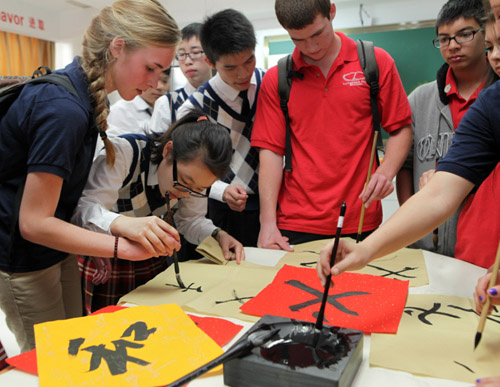Education fosters Sino-American cooperation
- By George N. Tzogopoulos
 0 Comment(s)
0 Comment(s) Print
Print E-mail China.org.cn, December 19, 2017
E-mail China.org.cn, December 19, 2017

Cooperation on education could be the way to bring China and the U.S. closer together. [File photo]
Despite most official discussions between China and the U.S. focusing on policy and the economy, the two heads of state have not overlooked culture. When Chinese President Xi Jinping and U.S. President Donald Trump took on a set of institutional dialogues in April at Mar-a-Lago, they established the U.S.-China Social and Cultural Dialogue (SCD).
Chinese Vice Premier Liu Yandong and U.S. Secretary of State Rex Tillerson chaired the first SCD at the end of September in Washington D.C. They set the basis for closer cooperation in fields such as education, social development, science, technology, health and the environment. The two countries are in the process of engaging in conversations that affect the citizens of both and nurture common understanding despite existing differences.
According to the U.S. State Department, the SCD"showcases how peoples [from China and the U.S.] can live together for the next 50 years and build a shared future." The importance of culture in Sino-American relations was outlined during Trump's recent visit to Beijing. On the first day, he and First Lady Melania Trump toured the Forbidden City to learn about restoration efforts for historic Chinese sites and later attended a special performance by Peking Opera accompanied by Xi and his wife, Peng Liyuan.
Within this framework, official exchanges can shift focus to education as the China-Yale Youth Leaders Dialogue took place in New Haven and Washington D.C. a few days ago. Members of the Chinese delegation, who were selected by the All-China Youth Federation (ACYF) and China's State Administration of Foreign Experts Affairs, had the opportunity to attend lectures by respected American professors and visit government institutions and think tanks. Their expertise vacillated from law and the media to government and economics.
When young leaders from one side understand the other side and create communication channels, they can facilitate better collaboration and help to overcome cultural misunderstandings between the two sides. Over the years, this has occurred with Chinese students visiting the U.S. in droves, but now the reverse is gradually happening. A few months ago, The Wall Street Journal published an article titled:"Why American Students Need Chinese Schools." The more China is growing and is embracing innovation, the more the U.S. interest in its education system will develop.
Although Chinese may be a barrier for American students, the younger generation is keen on learning the language. It should be noted that Chinese is the most spoken language in the world, with 1.39 billion speakers according to data from the University of Duesseldorf. Hindi-Urdu follows with 588 million speakers and English with 527 million speakers. China therefore has an excellent opportunity: It can combine its open-up policy with giving incentives to foreigners to come to China and study Chinese. The hope is that, like English, Chinese will have no geographical boundaries.
The education partnerships between Chinese and American institutions are already bearing fruits. They include the partnerships between the Tsinghua Center and Brookings, and between East China Normal University and New York University. As a result, New York University created a campus in Shanghai, and it became the first Sino-U.S. joint venture university approved by China's Ministry of Education with independent legal person status. Furthermore, Duke Kunshan University is a partnership between Duke University and Wuhan University and is located in Kunshan, Jiangsu Province.
Perspectives for the future are bright. China's Ministry of Education and the U.S. Department of Education intend to expand their cooperation to strengthen career, technical, and vocational education in both countries. Washington and Beijing recently signed the Memorandum of Understanding on the U.S.-China Teachers of Critical Languages Program and are committed to carrying out activities including conferences for students, scholars, and alumni.
The Sino-American relations are multifaceted. The growing interest in themes such as the North Korean imbroglio, the South China Sea dispute, and the general trade disagreements should not lead to culture exchanges to be overlooked. It is cultural cooperation – in this case educational cooperation – that can mobilize societies to come closer.
George N. Tzogopoulos is a columnist with China.org.cn. For more information please visit:
http://www.china.org.cn/opinion/GeorgeNTzogopoulos.htm
Opinion articles reflect the views of their authors, not necessarily those of China.org.cn.






Go to Forum >>0 Comment(s)